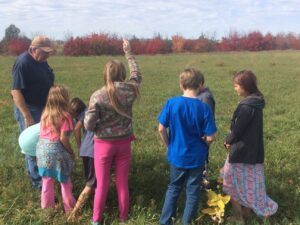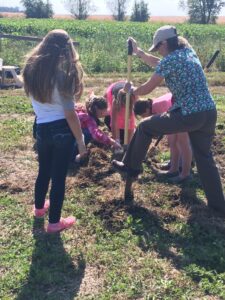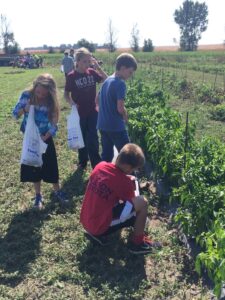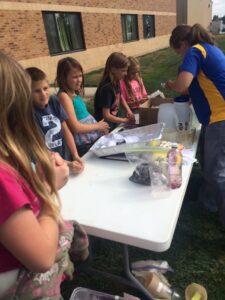Final Report for YENC15-084
Project Information
The grant supported by USDA/SARE for Youth Educators was a great success for the Irene-Wakonda Fifth graders. The students were exposed to new information about sustainable agriculture, local food system, nutrients in food ingested when eaten ripe, wetlands, soil health, cooking with whole food, native plants, and water conservation.
We engaged speakers from the surrounding communities to assist with our education sessions. We had the local USDA/NRCS officer for our county assist with two of the sessions, a local vegetable market farmer, the president of the local Farmer's Market, the manager of a local hardware store, and the local 4H educator help with the sessions.
Many of these educators had never been to our small town of Wakonda. The students sensed that this was special. It was the information that engrossed the students. During the first session on Soil Health with Jeff Loof, the students were amazed at the soil holding capabilities of healthy soil during heavy rains versus hard, worn soil when viewing the soil simulator demonstrations.
This first education session was followed by the field trip to the Hebda Produce farm twenty miles southwest of Wakonda. The students were engaged in harvest of fruits and vegetables that they brought back to the school. They saw how the plants were growing and the farmer discussed the nutrient value in his fresh-picked produce versus the produce they buy in grocery stores from far away.
The third session, featured the Vermillion Area Farmer's Market president, Dr. Amy Schweinle, who reiterated Dale Hebda's point of the health of local produce. She brought a very interesting, conceptual activity for the students. She gave them plastic cups with colored water and pieces of paper towel. The kids were to draw a plant on the towels. Amy then told them if they were such and such distance from a grocery store they would have to cut such and such off their plant. The local plants were able to absorb the most 'nutrients'. Students observed this and cheered on the students holding the local plants. Amy then took them into the school kitchen to make delicious salsa and potato pizza with the vegetables they had harvested on their field trip the week before. The apples they harvested they just all brought home to share with their families and eat whole and fresh. (Many of the students in their evaluations stated this was their favorite session.) Amy gave each student and teacher a $5 Market Buck Certificate to be used at the Vermillion Farmer's Market in 2016.
The final session, was a three-station learning experience in which at one station they learned how to make rain barrels with the manager of True Value Hardware, the next station they learned about wetlands with the Clay County 4H Leader, and the last session was with Jeff Loof from the Clay County USDA/NRCS office who took them into the prairie behind their school and introduced them to the plants and soil conservation.
Impact of this grant on students: increase in knowledge, exposure and awareness of the term sustainable agriculture, and a well-rounded impact of what it is and how it affects their world. They were exposed to what it means for the earth and the creatures in and on the earth, for the plants, transportation of produce, and the effect on taste of produce and healthfulness of produce. They were able to to enjoy the natural world and exposure to learning outside of the four walls of their classroom. It seems one of their most favorite parts was being in the school kitchen, then sharing the food they harvested and processed. This Spring, when we start their pumpkin seeds saved from last Fall, there will be a whole new awareness of growing local. It will continue on into their 6th grade Fall semester.
Impact of grant on community: The immediate impact on the local community was enthusiasm by parents, the local garden club, a local cafe. and the nursing home. There is support now to expand the school garden. Although our focus will remain with the school for now, volunteers have expressed interest in developing raised beds and expanding what we have now. The field trip was successful, and the teacher discussed how well her students behaved out of class. She said she will entertain the idea of taking the students to the Hebda farm in future years. The teachers were impressed with the students' enthusiasm for cooking in the school kitchen. The kitchen staff was thoroughly supportive of this endeavor as well. We hope to see more interaction between the students and kitchen 'science' in the future. The full impact on neighboring schools has yet to be recorded. We do plan to share our experience with Centerville and Vermillion school districts.
Future plans include full write-up for the local newspapers and direct contact about the project with neighboring schools. The University of South Dakota Nursing students plan on coming to assist our school in the Fall of 2016, and it is the school garden that they are most interested in. They would like to incorporate lesson plans on nutrition and preventative health into some of their class presentations.
Field Trip and Photo permission letter every parent signed before the 9.21.2015 field trip
Evaluation form post-ed sessions
Pre-survey form given to students
Field day at the school Potato harvest at Hebda's
Tomato and pepper harvest at Hebda's Field day Wetlands table



